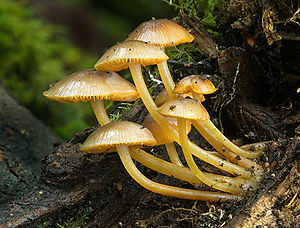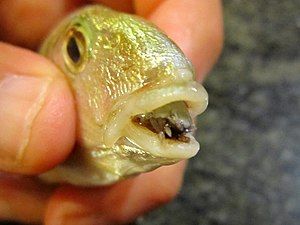
Back بوابة:علم البيئة Arabic Portal:Ecologia Catalan Portal:Økologien Danish Portal:Ecología Spanish درگاه:بومشناسی Persian Portail:Écologie French 포털:생태학 Korean Портал:Екологија Macedonian Portal:Ecologia Portuguese Portal:Ecologie Romanian
| |
|
|
Ecology
|
|
Ecology (from Ancient Greek οἶκος (oîkos) 'house', and -λογία (-logía) 'study of') is the natural science of the relationships among living organisms, including humans, and their physical environment. Ecology considers organisms at the individual, population, community, ecosystem, and biosphere levels. Ecology overlaps with the closely related sciences of biogeography, evolutionary biology, genetics, ethology, and natural history. Ecology is a branch of biology, and is the study of abundance, biomass, and distribution of organisms in the context of the environment. It encompasses life processes, interactions, and adaptations; movement of materials and energy through living communities; successional development of ecosystems; cooperation, competition, and predation within and between species; and patterns of biodiversity and its effect on ecosystem processes. Ecology has practical applications in conservation biology, wetland management, natural resource management (agroecology, agriculture, forestry, agroforestry, fisheries, mining, tourism), urban planning (urban ecology), community health, economics, basic and applied science, and human social interaction (human ecology). The word ecology (German: Ökologie) was coined in 1866 by the German scientist Ernst Haeckel. The science of ecology as we know it today began with a group of American botanists in the 1890s. Evolutionary concepts relating to adaptation and natural selection are cornerstones of modern ecological theory. Ecosystems are dynamically interacting systems of organisms, the communities they make up, and the non-living (abiotic) components of their environment. Ecosystem processes, such as primary production, nutrient cycling, and niche construction, regulate the flux of energy and matter through an environment. Ecosystems have biophysical feedback mechanisms that moderate processes acting on living (biotic) and abiotic components of the planet. Ecosystems sustain life-supporting functions and provide ecosystem services like biomass production (food, fuel, fiber, and medicine), the regulation of climate, global biogeochemical cycles, water filtration, soil formation, erosion control, flood protection, and many other natural features of scientific, historical, economic, or intrinsic value. (Full article...) Selected article - Selected image -Wasp mimicry - A and B show real wasps; the rest are mimics: three hoverflies and one beetle. Mimicry is part of the evolutionary process of adaptation.
General imagesThe following are images from various ecology-related articles on Wikipedia.
Related WikiProjectsThings you can do
Entries here consist of Good and Featured articles, which meet a core set of high editorial standards.
 Parasitism is a close relationship between species, where one organism, the parasite, lives on or inside another organism, the host, causing it some harm, and is adapted structurally to this way of life. The entomologist E. O. Wilson characterised parasites as "predators that eat prey in units of less than one". Parasites include single-celled protozoans such as the agents of malaria, sleeping sickness, and amoebic dysentery; animals such as hookworms, lice, mosquitoes, and vampire bats; fungi such as honey fungus and the agents of ringworm; and plants such as mistletoe, dodder, and the broomrapes. There are six major parasitic strategies of exploitation of animal hosts, namely parasitic castration, directly transmitted parasitism (by contact), trophically-transmitted parasitism (by being eaten), vector-transmitted parasitism, parasitoidism, and micropredation. One major axis of classification concerns invasiveness: an endoparasite lives inside the host's body; an ectoparasite lives outside, on the host's surface. (Full article...)Selected biography -
Joan Roughgarden (born 13 March 1946) is an American ecologist and evolutionary biologist. She has engaged in theory and observation of coevolution and competition in Anolis lizards of the Caribbean, and recruitment limitation in the rocky intertidal zones of California and Oregon. She has more recently become known for her rejection of sexual selection, her theistic evolutionism, and her work on holobiont evolution. (Full article...)
Did you know (auto-generated)
Selected quote -
Ecology news
Additional News Highlights
Selected publication -The Journal of Wild Culture was a short-lived magazine combining, among other things, artistic perspectives on ecology and environmental issues. It was published in Toronto from 1986 to 1991. The Journal of Wild Culture (JWC) was the literary organ of The Society for the Preservation of Wild Culture (SPWC), an arts organization devoted to exploring environmental and ecological issues from an artistic perspective, and ideas provoked by the term "wild culture". The magazine and the activities of the Society were best known for carrying on the nature-culture discourse in a "quirky and innovative" manner, and for influencing the way serious themes could be delivered with a sense of play and timeliness. (Full article...) Related portalsMore did you know -Related articlesAssociated WikimediaThe following Wikimedia Foundation sister projects provide more on this subject:
Web resourcesPreview warning: Page using Template:Div col with unknown parameter "1 = 2"; use colwidth= to specify column size
Discover Wikipedia using portals |
© MMXXIII Rich X Search. We shall prevail. All rights reserved. Rich X Search














































